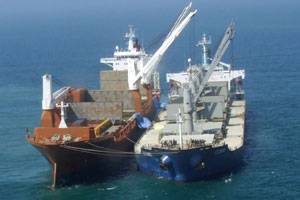Acceptance of LOF in U.S. Waters
There is growing acceptance of Lloyd’s Open Form as the optimum contract for response to serious marine emergencies in US waters according to SMIT Salvage. A number of cases over the past few years have provided demonstration of the efficacy of LOF when responding to vessels with a potential to cause significant environmental damage. The effectiveness of the LOF system relates to the fact that the contract, once agreed, gives a set of very clear responsibilities to the salvor. The salvor’s ability to operate within the Incident Command System has been demonstrated to good effect and has proven successful when contracted under LOF.
SMIT Salvage’s recent LOF cases in US waters include the bulk carrier Eltanin. This vessel grounded off Sabine, in the US Gulf, on March 1. The casualty, with a cargo of 44,000 tonnes of prilled sulphur, went aground some 14 NM off the coast. SMIT’s Houston base responded. A Lloyd’s Form was agreed and a salvage team was mobilized to the location, via Port Arthur. Subsequently, this team was reinforced from Rotterdam.
A salvage inspection led to the conclusion that a part discharge would be required for a refloating. This was achieved by March 11, with prilled sulphur grabbed out by the geared lightering vessel Suomigracht. The Eltanin was refloated later that day and inspected prior to the back loading of around 9,000 tonnes of cargo.
Fortunately, the Eltanin grounded on a soft bottom; there was no significant hull damage. The Eltanin was redelivered to the owners and then cleared to proceed with her planned voyage to China after a class approved diving survey. This operation was marked by a very high level of cooperation between the owners, salvors and the local oil spill response community. No pollution resulted from this grounding.
SMIT Salvage in Houston, dealt with a LOF casualty last year, on behalf of the OPA90 joint venture company Donjon-SMIT, with some similarities to the Eltanin case. This 2008 LOF salvage involved the Greek flag bulk carrier Antalina, also carrying a cargo of sulphur. The vessel became an indirect victim of Hurricane Ike last September. Antalina suffered an engine breakdown and collided with an offshore platform during its attempt to reach the open Gulf of Mexico before Hurricane Ike arrived. The casualty required an emergency tow and was brought to safety.
March this year saw SMIT Salvage respond to a second emergency in the US Gulf, when the crude carrier SKS Satilla developed an 8 deg. list whilst approaching Galveston to lighter. The 180,000 DWT vessel was fully laden. The immediate priority was to correct the list, followed by a ship-to-ship transfer of the cargo.
A SMIT salvage team immediately responded from Houston, boarding the DP2 ROV support vessel Northern Canyon for this assignment. Subsequently, an underwater inspection found that SKS Satilla had been saved by her double hull. The vessel had hit a submerged object that had torn her port side shell over a length of 200 ft. The tanker’s Master had anchored up and ordered counter-flooding, in coordination with damaged strength calculations provided from shore, to reduce the list. This was successful. The STS was then performed by SMIT’s team, once again reinforced from Rotterdam. Cargo was transferred over a four-day period, in concert with damage strength and stability calculations and planning. During April the SKS Satilla was able to proceed under her own power to a Turkish repair yard.
Northern Canyon then explored the tanker’s track immediately prior to the accident. It was found the tanker had struck the wreck of the drill rig ENSCO 74, lost during Hurricane Ike. This wreck was immediately adjacent to a Designated Crude Oil Ship to Ship Lightering Zone. As a first step, ENSCO awarded an oil removal contract to SMIT. Hot-tap equipment was used to penetrate submerged tanks, for the pump-out of oil. SMIT divers penetrated the capsized wreck and recovered oil from interior tanks and also free floating, trapped within the internal machinery and storage spaces.
The ROV survey had revealed that ENSCO 74 had capsized in 100ft of water, but that a large area of its hull was only 25ft below the surface. USCG has indicated this should be removed as quickly as possible and SMIT has provided a full wreck removal option to dispose of the wreck at a shore side scrapping facility. A decision is awaited from owners on future action regarding this wreck. An Ocean Dumping solution is under consideration.
Extreme weather events are on the increase worldwide. This has already increased the global demand for salvage services, in the aftermath of hurricanes and similar disasters. In the US Gulf, SMIT worked for seasons to deal with the legacy of Hurricanes Katrina and Rita. This involved many wreck removals and associated operations concerning rigs and marine casualties lost and stranded during these hurricanes.
This June SMIT mobilized for a major wreck removal concerning another victim of Hurricane Ike. This involves the remains of the rig Pride Wyoming. During Hurricane Ike this rig broke into three sections and SMIT’s team is contracted to deal with two of them. The third section - the remains of the rig’s legs, derrick and drill floor – has already been prepared by SMIT for lifting by a third party.
The floating sheerlegs Taklift 1, with a lift capacity of 800 tonnes, will assist in SMIT’s removal of the platform’s mat section, found in 55 ft of water. When this work is completed, the wreck removal spread will move 30 miles to a second location, to cut and remove the hull section, lying in 30 ft of water. The work will be finished during the final quarter of this year. Careful planning is a feature of these operations, as the mat section is in an area of dense seabed pipeline infrastructure. All work will be performed with the aim of avoiding any additional damage.
Recent casualty response cases involving SMIT include salvage assistance in May for the 25,000 DWT bulk carrier CB Paradise, grounded off Surinam. This casualty was refloated with a SMIT team in attendance. In addition, June saw another LOF operation – an emergency tow in the Atlantic for the UAL Nigeria. This project cargo/container vessel was bound for Africa when she required assistance. The vessel was towed into Trinidad, where project cargo was discharged prior to drydocking.
SMIT’s workload in June also included the 120,000 DWT crude carrier Elektra. This tanker suffered bottom damage in a grounding in the Straits of Magellan, resulting in the flooding of double hull spaces. Prompt action was taken to stop leakage into the pump room. The engine room remained sound. At the time of writing, work continues on the STS of Elektra’s cargo.
(Source: SMIT Salvage)















